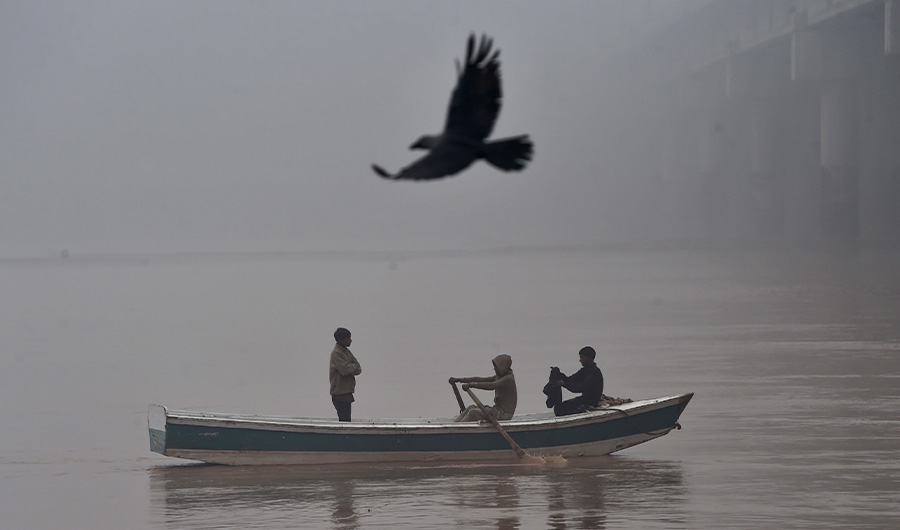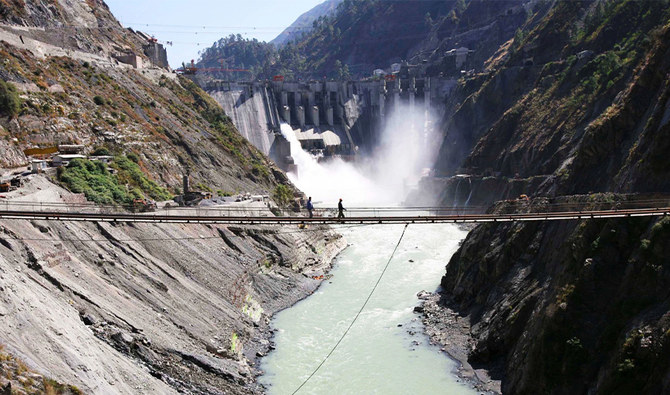ISLAMABAD: Outstanding water disputes between nuclear-armed neighbor Pakistan and India have the potential to become a flashpoint if the World Bank fails to mediate and implement a water treaty to resolve them amicably, Pakistan Indus Water Commissioner Syed Mehr Ali Shah said on Monday.
The Indus Waters Treaty between Pakistan and India was brokered by the World Bank and signed in Karachi in 1960. The treaty gives control over the waters of the three eastern rivers — the Beas, Ravi and Sutlej — to India, while control over the waters of the three western rivers — the Indus, Chenab and Jhelum — lies with Pakistan.
Under the treaty, both the countries can approach the World Bank for arbitration in case of disputes over the use of water resources.

People ride a boat on the Ravi River in Lahore on December 16, 2019. (AFP/ File photo)
In August 2016, Pakistan approached the World Bank to constitute a court of arbitration over India’s two disputed projects: the 330 megawatts Kishanganga and 850 megawatts Ratle hydropower projects.
The Bank has not yet set up the court as India has sought the appointment of a neutral expert to resolve the conflict.
“Pakistan insists that the World Bank must constitute a court of arbitration on our request that is pending with it for the last four years,” Shah told Arab News in an interview. “If the World Bank shirks from its responsibility, water disputes are going to become another flashpoint [between India and Pakistan].”
“The bank should have immediately constituted the court instead of dilly-dallying,” Shah added.
He said two ongoing disputes with India – over the 1000MW Pakal Dul and 40MW Lower Kalnai – were at the Indus commissioners’ level, and Pakistan would take them to the World Bank for mediation if it failed to resolve them at the bilateral level.
In recent years India has begun ambitious irrigation plans and construction of many upstream dams, saying its use of upstream water is strictly in line with the treaty.
Pakistan has opposed some of these projects saying they violate the World Bank-mediated treaty on the sharing of the Indus waters, upon which 80 percent of its irrigated agriculture depends.
Shah said that India had planned at least five future hydropower projects on the shared water, therefore the World Bank as a guarantor of the treaty “will have to play an effective role to keep this peace instrument between Pakistan and India intact.”
Shortly after the partition of the sub-continent into Pakistan and India in August 1947, tensions soared over the water rights of the rivers flowing between them. Since the ratification of the treaty after nine years of negotiations, both the neighbors have not engaged in any water wars, despite waging full-scale wars over the Muslim majority Kashmir valley, which both claim in full and rule in part.
Dr. Pervaiz Amir, water expert and regional member of the Global Water Partnership, said that Pakistan would face ‘existential threat’ in case India stopped its water and kept building hydropower projects in violation of the Indus Water Treaty.
“Pakistan needs to enhance its technical capacity including engineering and legal to evaluate Indian hydropower projects, and can take them to international forums for settlement, other than the World Bank,” he told Arab News.
He, however, said that both the countries should renegotiate the treaty to include subjects like groundwater resources, environmental flows like canals and climate change.
“Both Pakistan and India should cooperate with each other.” he said, “to make the best possible use of water resources instead of wasting time over arbitrations.”
















